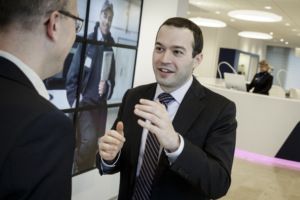Business
Encountering new things and learning about all parts of the business
This article is more than 10 years old.
Greek corporate internal auditor Alexi Pavlou tells us about his workplace

Alexi Pavlou, a Greek corporate internal auditor at ISS (photo: Michael Hyldgaard Løgholt)
What’s your job title and what does your job involve?
I’m a corporate internal auditor at ISS. Our team is basically responsible for reporting to management to ensure that our targets are being met and that our procedures are being followed.
No two days are the same, but my time is split between going from meeting to meeting with people in the organisation and working on analysing the results of these meetings.
This involves a lot of travel – I normally have about one trip a month and sometimes more. I meet with people from all departments and in all positions within the company – in our subsidiaries and at head office.
My job is to find out what we should be doing more and what we should be doing less of according to our strategies. It is a very broad mandate, and that is something I really enjoy about the job. You are constantly encountering new things and learning about all of the different parts of the business.
What brought you to Denmark?
I came to Denmark primarily for the job. Throughout the recruitment process, I got the impression of a company with a great vision and a team that could make it happen.
ISS as a company is a leader in its industry, and I really admire how it operates. I had also heard a lot of positive things about Denmark and Copenhagen from people I know.
So when I was offered the position, it was an easy decision to make!
I’ve only been here for three months, but things have started really well with settling into life in Denmark – both on the job side and personally.
How does working at ISS compare to other companies you’ve worked for?
One major advantage is how people work together for a common cause. Communication is very streamlined, and people share the same values about how we do business.
You are held to a very high standard in terms of what is expected of you, but everyone is also willing to help each other out, so there is a lot of support.
How does living in Denmark compare to the other countries you’ve worked in?
From the short time that I’ve been here I have the impression that things work very smoothly here – in public administration, for example. But as well as being efficient, people are very friendly. It is like a well-oiled machine, but with a human face!
What is the best thing about working for ISS?
I’m really impressed by the fact that everything has been very clear from the beginning – there have been no hidden surprises. This applies both to the job and to the process of helping me move to Denmark. I think that this has a lot to do with the culture of the company that it is very open and transparent.
What did you find most surprising about the living and working in Denmark?
So far the thing that’s surprised me most is the weather – it’s been much warmer than I expected! I was in Greece over the holidays, and it was so much colder than Denmark that I actually caught a cold from being there!
What do you see as being the most important things expat employees can offer to Danish companies?
Denmark is a small country and a very small market by European and international standards. It has had a lot of success, but in order to maintain this success and continue to bring prosperity to the country, it needs to grow on an international scale and stay competitive. This means selecting the best talent both domestically and internationally. Expats can offer a great deal of international experience that can help in the constant struggle to compete.










































